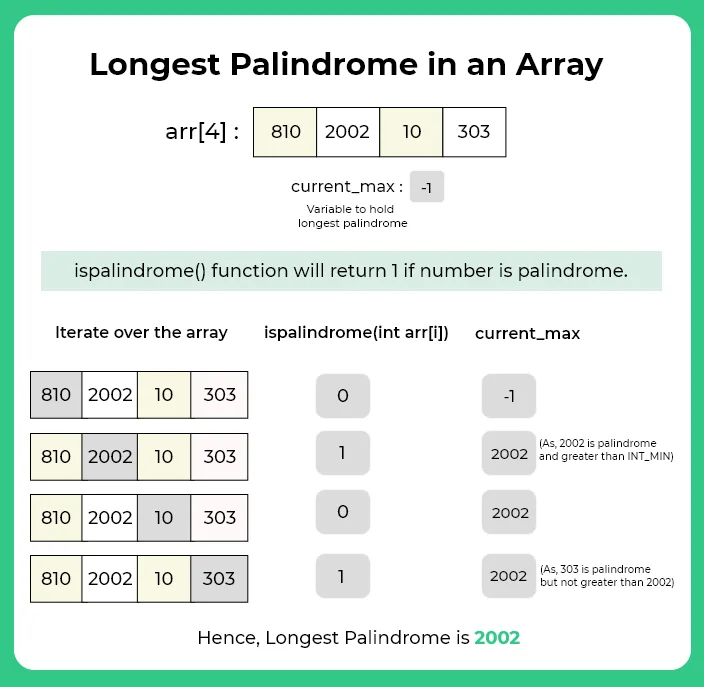Find the Longest Palindrome in an Array using Python

Longest Palindrome in an Array
Here, in this page we will discuss the program to find the longest palindrome in an array in python programming language, we will discuss two different methods to find the longest palindromic element in the given array.
Here in this page we will discuss the following methods to find the longest palindromic number.
- Method 1 : Using Naive Approach
- Method 2 : Using Sorting
Method 1 :
- Create a function ispalindrome(int n), it will return 1 if the passing number is palindrome otherwise return 0.
- Inside the main function, create a variable say res = -1, that hold the maximum palindrome number.
- Run a loop from [0, n), and check if(ispalindrome(arr[i]) && res<arr[i]), then set res = arr[i].
- Print the value of res.

Method 1 : Code in Python
Run
# Function to check if n is palindrome
def isPalindrome(n):
divisor = 1
while (int(n / divisor) >= 10):
divisor *= 10
while (n != 0):
leading = int(n / divisor)
trailing = n % 10
if (leading != trailing):
return False
n = int((n % divisor) / 10)
divisor = int(divisor / 100)
return True
# Function to find the largest palindromic element
def largestPalindrome(arr, n):
currentMax = -1
for i in range(0, n, 1):
if (arr[i] > currentMax and isPalindrome(arr[i])):
currentMax = arr[i]
return currentMax
# Driver Code
arr = [1, 232, 5545455, 909090, 161]
n = len(arr)
# print required answer
print(largestPalindrome(arr, n))Output
5545455
Prime Course Trailer
Related Banners
Get PrepInsta Prime & get Access to all 200+ courses offered by PrepInsta in One Subscription
Method 2 :
In this method we first sort the array and then start traversing the array from end, and return the element that satisfy the condition, that it is palindrome.
- Sort the array using inbuilt sort() function.
- Start traversing from end of the array,
- Print the element if it is palindrome.
- If no element found then print -1.
About sort() function in Python
The sort() method is a built-in Python method that, by default, sorts the list in ascending order.However, you can modify the order from ascending to descending by specifying the sorting criteria.
array_name.sort(reverse=True|False, key=myFunc) , this will sort the array in descending order.
Method 2 : Code in Python
Run
# Function to check if n is palindrome
def isPalindrome(n):
divisor = 1
while (int(n / divisor) >= 10):
divisor *= 10
while (n != 0):
leading = int(n / divisor)
trailing = n % 10
if (leading != trailing):
return False
n = int((n % divisor) / 10)
divisor = int(divisor / 100)
return True
# Function to find the largest palindromic element
def largestPalindrome(A, n) :
# Sort the array
A.sort()
for i in range(n - 1, -1, -1) :
# If number is palindrome
if (isPalindrome(A[i])) :
return A[i]
# If no palindromic number found
return -1
# Driver Code
arr = [1, 232, 5545455, 909090, 161]
n = len(arr)
# print required answer
print(largestPalindrome(arr, n))Output
5545455
Login/Signup to comment




arr = [1, 232, 5545455, 909090, 161]
len_array=[]
for i in range(len(arr)):
len_array.append(0)
for i in arr:
temp=i
rem=0
rev=0
count=0
while(i!=0):
rem=i%10
rev=rev*10+rem
i=i//10
count+=1
if rev==temp:
len_array.insert(count,temp)
print(len_array[len(len_array)-1])
def is_pallindrome(Arr):
l=[]
for i in range(len(Arr)):
a=Arr[i]
if a==a[::-1]:
l.append(int(a))
maxi=-1
for i in range(0,len(l)):
if int(l[i])>maxi:
maxi=l[i]
print(maxi)
Arr=list(input().split())
is_pallindrome(Arr)
#palindrome number longest
arr=list(map(int,input().split()))
z=1
for i in arr:
if str(i)==str(i)[::-1]:
if len(str(i))>z:
z=i
print(z)
my approach
arr=[101,202,230,303,2002,3250]
max=arr[0]
for i in range(len(arr)):
reverse = int(str(arr[i])[::-1])
if arr[i] == reverse and reverse>max:
max=arr[i]
print(max)
//Try this in C: Longest palindrome in array
#include
int main()
{
int arr[100],n,i,j,l_pallindrome=0;
printf(“Enter the size of array: “);
scanf(“%d”,&n);
for(i=0;i<n;i++)
{
scanf("%d",&arr[i]);
}
for(i=0;i0)
{
rem=temp%10;
rev=rev*10+rem;
temp=temp/10;
}
if(arr[i]==rev)
{
if(rev>l_pallindrome)
{
l_pallindrome=rev;
}
}
}
printf(“The longest palindrome in array : %d”,l_pallindrome);
return 0;
}
n=int(input())
arr=list()
arr1=list()
for i in range(0,n):
arr.append(int(input()))
for i in arr:
temp=i
rev=0
while(temp>0):
rem=temp%10
rev=rev*10+rem
temp=temp//10
if(i==rev):
arr1.append(rev)
print(‘maximum element is -‘,max(arr1))
arr = list(map(int,input().split())
a = []
flag = True
for i in arr:
if(str(i) == str(i)[::-1]):
a.append(i)
flag = False
if(flag):
print(“no palindromic number in array”)
else:
print(max(a))
def is_palindrome(ele):
temp = ele
reverse = 0
while temp > 0:
rem = temp % 10
reverse = reverse * 10 + rem
temp = temp // 10
if reverse == ele:
return digits(ele)
else:
return 0
def digits(ele):
n = ele
count = 0
while n > 0:
rem = n % 10
count += 1
n = n // 10
return count
arr = [1210, 11211, 1112111, 141, 11411]
list = []
for i in range(len(arr)):
list.append(is_palindrome(arr[i]))
def largest(list):
largest_ele = list[0]
for i in range(len(list)):
if largest_ele < list[i]:
largest_ele = list[i]
for i in list:
if largest_ele == list[i]:
return print(f"{arr[i]} is the longest palindrome with {largest_ele} digits")
largest(list)
s=int(input())
lst=[]
arr=[]
a=0
for i in range(0,s,1):
n=int(input())
lst.append(n)
for j in lst:
if str(j)== str(j) [::-1]:
arr.append(j)
arr.sort()
l=len(arr)
print(arr[l-1])
#A number is 526625 .If you read number “526625” from reverse order,
# it is same as “526625”.
from array import *
a= int(input(“enter the number of input :”))
b=array(“i”,[])
for x in range(a):
b1=int(input((“Enter a value :”)))
b.append(b1)
m=[]
for x in range(a):
c1=str(b[x])
if c1 == c1[::-1]:
m.append(c1)
print(max(m))
n=int(input())
l=[]
for i in range(n):
l.append(int(input()))
l.sort(reverse=True)
for x in l:
if str(x)==str(x)[::-1]:
print(‘longest palindrome’,x)
break
else:
print(‘no’)
//Longest Palindrome in an Array in C language
#include
int palindrome(int);
void main()
{
int i, n,count=0,s,c=0;
printf(“Enter the size of array:”);
scanf(“%d”,&n);
int a[n];
for(i=0;i<n;i++)
{
printf("element – %d : ",i);
scanf("%d",&a[i]);
}
int p[20];
int j;
for(i=0,j=0;i<n;i++)
{
int result=palindrome(a[i]);
if(result==1)
{
p[j++]=a[i];
c++;
}
}
for(j=0;j<c;j++)
{
printf("palindrome array is =%d\n",p[j]);
}
int small=p[0];
for(j=1;j<c;j++)
{
if(small0)
{
int r=temp%10;
temp=temp/10;
sum=sum*10+r;
}
if(sum==p)
{
return 1;
}
else
{
return 0;
}
}